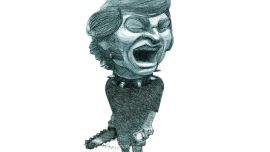There’s only one office inside the Casa Rosada where President Mauricio Macri enters without knocking. It’s the same one that’s regularly visited by the highestranking government officials too.
With dried fruits and Sugus sweets of all colours, Cabinet Chief Marcos Peña welcomed Perfil to his office last week. With an open agenda, he acknowledged the strength the recent economic crisis that’s hit Argentina, yet insisted that he remained confident about the possibility of striking a deal with the Justicialist Party (PJ) over upcoming austerity policies that will be included in the govenment’s Budget for 2019.
What’s the current outlook for the economy?
We are coming out of a storm that hit us hard, caused mainly by external factors but also by domestic ones. We had several months of growth and recovery but now we’ll have a colder and more recessive economy, yet still with the main elements to drive us on a path of development and growth.
To what extent can you say that the currency crisis has ended?
Thinking in a wider context, Argentina is a country that is vulnerable to the different changes that happen across the world. That’s what we are trying to change now.
As long as we have a fiscal deficit, we’ll be vulnerable to the need of foreign funding. As long as we have an energy matrix that imports oil and gas, we’ll be vulnerable. As long as we rely a lot on just a few products, such as the soy harvest, we’ll be more vulnerable. We are working on those three areas in order to be more solid.
We came out of the crisis strengthened, with a more competitive exchange rate and an agreement with the International Monetary Fund that gives us an important financial umbrella and the possibility of reducing our fiscal deficit faster. But we have to understand that it’s impossible to say that the global context won’t continue to be volatile. There are decisions that we don’t take.
Were these months the most difficult ones yet for the government?
The most difficult months were the first ones. We received a broken country with no foreign currency reserves, no access to funding, a minority position at Congress and a very hostile and aggressive Kirchnerism that didn’t even want to recognise our victory. The first six months were challenging. In fact, they created the challenge of avoiding that crisis and 2016 ended up being a bad year in economic terms.
But back then you were just starting in office, you didn’t have a presidential election coming up in a year and a half…
This is different. The discussion is not structural. It’s difficult to deal with a currency crisis because there are a lot of factors that you can’t control. When the market takes on that path, ending it is a big challenge. We managed to do it properly and faster than other crisis such as the Tequila or the Russian crisis, which lasted longer and had a more severe impact. Nevertheless, it’s a difficult situation to live with. We have to move past this volatility.
President Macri has admitted to mistakes from the government. What damage has the crisis caused?
The most severe damage is in the country, rather than inside the government. It’s the sensation of fear or anguish about whether we lost our path or if it’s possible to leave the crisis behind or if we are condemned to economy not starting at all.
Our task is to show, based on the reality and our administration, that those fears are unfounded. The reality is better than what some fear and much better than what some forecasted when they compare this crisis to other ones.
Is the economic cabinet working better, after the exits of [former Central Bank head Federico] Sturzenegger, [former Energy minister Juan José] Aranguren) and [former Production minister Francisco] Cabrera?
Yes, they were positive changes. The ones who left did a good job. As part of our team culture, we have to understand that changes in positions or functions doesn’t mean apportioning blame. It’s a permanent task, in order to find the best way of functioning possible.
Have you decided how austerity policies will be implemented? What will happen to the public works projects?
We have to move toward a fiscal balance. The country has had a deficit for most of its history. We were living on a lie, thinking we can spend more than what we have. Far from being a progressive policy, it was a recessive one that created poverty and instability. Finding a fiscal balance is the best way to achieve a longterm sustainable development.
The word austerity has been used for different things on different times. What we are discussing is the State moving toward a fiscal balance. In 2018 the efforts that we have to make in relation to [improving] GDP is greater than will have to be done next year. We believe this can be done, as we are on a path of economic growth. That means lowering taxes, promoting public work projects across the country and improving the quality of our expenditure. The discussions over the Budget, with us holding a minority position, means negotiating with more actors, some of which want to take a different path. We will find a middle point.
Have you considered continuing with the 2018 budget if you can’t reach a deal with the PJ?
Argentina has to fulfill its commitment to reduce to the fiscal deficit to 1.3 percent of the GDP next year. We guarantee that commitment, but we are open and about reaching political agreements for the budget to be the most politically representative possible. The commitment goes beyond us. We believe there are important sectors in Peronism that want to be part of an Argentina that takes on the challenge of solving problems.
What sectors of the PJ do you consider trustworthy?
We have to have that conversation without prejudice. We always dismissed the possibility of Kirchnerism being open to that discussion. But we are hopeful that it could change. From the rest, non-Kirchnerite Peronism, we managed at different moments to have agreements and take steps forward.
Should the government seek a deal with the PJ that goes beyond the Budget?
That is actually happening. [Two weeks ago], we voted the Law of Popular Neighbourhoods [slum urbanisation plan] and it was passed by all parties. There are few things more important for our country than dealing with a historic social debt. More than 200 judges have been appointed and we are also moving forward on many topics with the provinces.
Isn’t that more difficult with the PJ now thinking about the elections?
The elections are always in the mind of all political sectors. Last year we reached deals despite the elections. If Argentina is able to discuss fewer things and reach more consensus, we’ll all be better off.
Do you think Macri will trust in [Renewal Front leader Sergio] Massa and [leader of the Peronist bloc in the Senate Miguel Ángel] Pichetto?
Those are different personal situations. But the president is open to doing what’s necessary to make the country move forward. He acknowledges that there was always a great deal of respect for what each of them represent and bring to the table, despite it being possible to work closer with one or the other at some point in thepast. He also acknowledges dissidence. I see the president as committed to a wide agenda, beyond personal preferences, and thinking about the Argentina of the next 20 years.
Is it possible to think of the long term in Argentina?
The people who voted for us wanted to change, to look toward the long-term. Some used to tell us that people wouldn’t support us with their votes, but we always said they were mistaken. Argentina chose to change because if doesn’t want to be stuck in the past that led us to a frustrated and gridlocked Argentina. We are following the wishes of the people who voted this change. That will be the key discussion in 2019: whether we truly want to change and continue following this path or if we only look for the short-term to be better.
Do you agree that there’s a sector of the people who voted for Let’s Change that are disappointed?
Yes, it’s possible. But there’s also a wide sector that is still supporting, just as they have been from day one.
Did you rush into talking about the re-elections of Macri, [Buenos Aires Province Govenor María Eugenia] Vidal and [Buenos Aires City Mayor Horacio Rodríguez] Larreta?
We don’t decide what the media discusses. That’s not our task. We don’t believe that in a democracy there should be an obsession with controlling the public agenda, as happened with Kirchnerism. Our focus is on governing. If we do things right, the natural thing is for people to support us. We are a political project that has to think how we can continue winning elections, as we are the best representation of an alternative.
How is your relationship and the president’s with [Civic Coalition lawmaker Elisa] Carrio?
Very good. We have deepened the ties with everybody that’s part of Let’s Change, especially through the many battles we have fought together. We have strengthened the relationship, that’s what Let’s Change is about. [But] we all have to take care of the human factor in such a diverse coalition. With some there are more tensions than with others. We seek to take care of our relationship.
Do you think that Vidal and Larreta differentiate themselves from the national government?
No, we are part of the same core. We are a team that has been working together for over 15 years, with shared values, experiences and objectives and different roles and personalities. We trust each other and have a great day-today relationship.
Are they asking for more changes in the Cabinet?
We talk about everything all the time. We have been discussing every issue for many years. There are all kinds of conversations.
From the outside, it seems as though they are more focused on the national.
That’s something that’s good. We want them to be involved in the general political process. They have to prioritise their administrations, but we are enriched by their discussions of the general context of the country. We trust in them a lot.
Did Larreta and Vidal ask to be involved in the national administration?
It came up in conversation. We feel much more comfortable by having them close. They were involved on the first two years in the difficult moments. When there’s a difficult situation they are always here supporting us.
Vidal thinks that much of the criticism you receive is because you don’t want to argue with Macri.
The Cabinet Chief position was created to receive criticism. That’s OK, it’s part of the job. In some cases, the criticism is directed at me and in others it’s part of that elliptical message. But it’s not a position for thin-skinned people. Many who had this role before me were like that.
Are [Deputy Cabinet Chief Mario] Quintana and [Deputy Cabinet Chief Gustavo] Lopetegui out of the picture?
No. We are lucky to have them on the team and they play a key role in the dayto-day work. It’s a role that didn’t exist before: two people working to follow though the government’s management. They are working, with a big commitment and great results.
Do you feel older because of being in office?
I feel fine. I see it as 10-and-a-half years of government [since I started working]. This is bigger and more complex. But I’ve been in the dynamic of pressures and crises for over 10 years.
Is it true that you are sleeping less, because of the crisis?
No. The most intense days of the crisis were difficult for all of us because you have to follow the day-to-day events more and have a larger responsibility. One thing is discussing overall issues and another is when there’s an attack on the core of our plan. That adds extra pressure.
And Macri?
He is well, coping well with his position and he has his feet on the ground to understand the most important issue, beyond his family, which is the relationship with the people.
- This interview was originally conducted in Spanish for the Perfil newspaper and was translated by the Buenos Aires Times.


























Comments